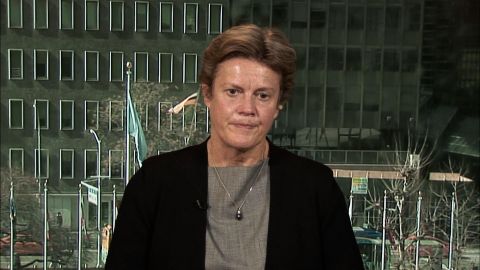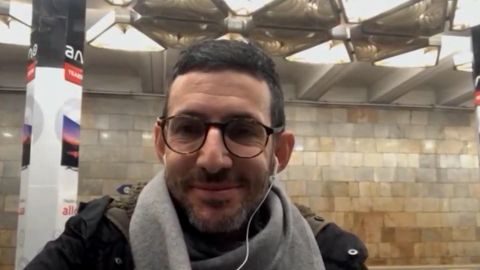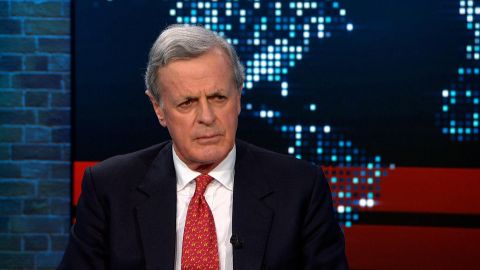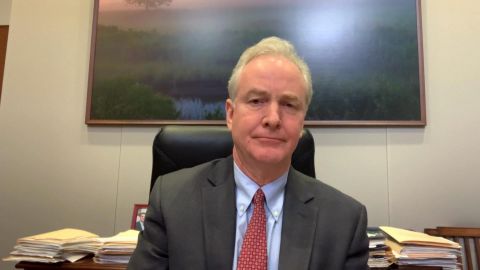Read Transcript EXPAND
CHRISTIANE AMANPOUR: Many civilians, as we said, in Kyiv are seeking shelter in the city subway stations. The New Yorkers’ Moscow correspondent and author, Joshua Yaffa, join Michel Martin from one of them last night. He had a firsthand account, of course, of the toll the way is taking on the people, not just “in the crossfire,” but increasingly, the targets.
(BEGIN VIDEO CLIP)
MICHEL MARTIN, CONTRIBUTOR: Thanks, Christiane. Joshua Yaffa, thank you so much for talking with us.
JOSHUA YAFFA, AUTHOR, “BETWEEN TWO FIRES”: My pleasure. Happy to be here.
MARTIN: I see that you’re in Kyiv. Do you mind telling us, you know, where you are? What are your circumstances?
YAFFA: Sure. I’m in Kyiv. I’m actually in the metro station. I came to see a friend of mine of the family who is spending her fifth night now in the metro station during the evening to hide from regular Russian bombardments of the city. I thought I wanted to come and say hello, support my friends. See how she and her family are doing and also, get a sense of what it’s like for so many people in Kyiv who are facing night after night of bombardment. And many of whom are hiding out in metro stations which functions as impromptu bomb shelters.
MARTIN: So, tell me a little bit about that, like how are people?
YAFFA: Yes. Sure. Well, let me scan like a little bit and you’ll just see the station and the train here. Every night, when curfew starts at 8:00 p.m., the train stations fill up, the metro stations feel with people. Most people are actually sleeping inside the train wagon. It’s a little bit warmer in there than it is on the cold concrete platform. Many people have bomb shelters under apartment blocks, in their neighborhoods. But for those who don’t or want the safety of being deeper underground and with other people, they come to the metro stations. There’s dozens of metro stations like this all across the city every night, they are filling up with families who are coming to try and get a safe place to hide out from the regular artillery and bombing and missile attacks facing not just Kyiv, but a number of Ukrainians just about every day now.
MARTIN: Is the bombing happen mainly at night or is it all day long?
YAFFA: There was a big one that went off this afternoon. In fact, I saw it from the hotel where we were staying until we came to the metro, a big cloud of black smoke erupted at around 4:00 or 5:00 this afternoon. And that was TV tower, the central TV tower in Kyiv, it had been attacked by Russian airstrikes. But, yes. In general, yes, the missile airstrikes and bomb strikes do tend to occur at night. I mean, you hear the sirens going off all throughout the day in Kyiv. I mean, any time you’re anywhere around town. At any moment, you can hear the air raid siren and people do generally try and hustle into a building, into a basement or bomb shelter if they can find one. But it seems like most of the missile attacks, the bombs attacks are happening at night. You know, that separate question from when — you know, whether it’s tank or armor, small arms, infantry battles are happening — you know, that happens to a different schedule. But in terms of the area of bombardment, that does seem to be a nighttime activity.
MARTIN: How would describe the mood there? I mean, I think many people — you know, most people have never lived through this. I mean, some people throughout the world have lived through this, but most people from the West have not, frankly.
YAFFA: Well, I mean, the most remarkable thing about Kyiv is until a week ago what absolutely recognizable European Cosmopolitan City it was. I’ve been here for about three weeks, and the first two weeks of my time here, I spent my evenings going out to wonderful stylish delicious restaurants with friends, enjoying the atmosphere of a European capital. And it’s remarkable how quickly that’s all changed now. Dramatically, that’s changed. A lot of people have left the city. A lot of people left even before Russia invaded on the 24th as U.S. intelligence and others started to warn about the inevitability of that war. Of course, there was a big exodus on the 24th when Russia began its invasion. And my friend who is here on the metro has told me that the crowd has even thinned out in the past five days. And some people who didn’t manage to leave before the war, in the first day or two of the war have now managed to find a way out of the city. And the city is definitely thinned out. I mean, it’s really a ghost town, in fact, if you walk around the streets during the day, but that’s because most people who’ve stayed, and of course, the vast majority of people in Kyiv still have stayed, it’s the city of number of million people. So, people are very much still here. But they’re at their homes, in their apartments trying not to go outside, only going outside to go to the grocery store once every two days, but lines in the grocery, if you can find one that’s opened, are around the block. We were at a grocery store the other day where people said they’ve been waiting for two and a half hours and they weren’t even close to be front of the line. My friend here who is a journalist hasn’t been able to really cover much of this war. And instead, has just been involved in trying to solve the most elementrial questions of survival with — for her and her mother, how to get food, how to come in and out of the metro where they’ve been sleeping for safety, when to go home to take a shower, when to go home to buy food, to cook food, to bring it back to the metro. So, people are just trying to make it through the day, really, and trying to stay safe and trying to keep their families safe. I mean, that’s the number one concern for most people. And there’s also, I’d say a mix of real pride in how the Ukrainian state and Ukrainian military has been able to hold off the Russian invasion for the last five days. It seems like, at least, the Russian calculation was that Kyiv would fall in a matter of days, and it hasn’t. There are Ukrainians that he’s following and the Russian troops are moving deeper and deeper into the Ukraine. But nonetheless, the Ukrainian military has held them off in a way that no one expected. So, there’s a real pride and energy for people. But at the same time, there’s a real trepidation, a knowledge that perhaps that can’t last forever, they’re not going to last. You know, Russia has such a formidable military machine that the Ukrainian, for all of its success, skill and bravery, might not be able to hold them off forever. And there’s a lot of understandable anxiety about that and uncertainty. There is one young woman here in the metro tonight in Kyiv whose family is living in the Ukrainian City of Kherson, in the south. It’s near Crimea. And Kherson just today was captured today by Russia. There are now Russian troops walking through her hometown. Her parents look out their window and saw Russian tanks in the streets. And so, of course, has her racked with fear and uncertainty about what comes next. Will she be able to go home, right? Will she be able to see her parents? How does that work? Will they be able to get to see her? So, of course, there’s a lot of uncertainty and fear, which is, I think, completely understandable given the circumstances of what Ukraine is living through at the moment.
MARTIN: I just did want to ask, if anybody is angry, did they feel that they were ill-prepared? Because you’re not the only person who has mentioned that. Just a couple of weeks ago, people are going to cafes and living their normal 24th century life. And then, all of a sudden, this. I’m just wondering if anybody feels angry that they feel like they should have been better prepared for this?
YAFFA: Well, the anger that I get is an incredible amount of anger toward Russia and toward Putin. I mean, just the amount of just (INAUDIBLE), all that fury that I have heard towards Russia has really been remarkable. Remarkable because it calls into question what is, in fact, Putin’s plan here? What’s the kind of political endgame to this military campaign? The idea presumably if we just go by both Putin’s statements and the way that he’s put his military into battle clearly with the intention of capturing Kyiv. There’s some idea that Russia would take over, at least, some portion of the Ukrainian State and install its own pro-Russian government and have a kind of client state here in Ukraine. But I don’t know how that works just given the degree and depth and scale of anger here and how I’ve just heard that from so many different people representing so many different generation, segments of society and it’s just so deep at this point. The way that Russia has really lost Ukraine. A country that I’ve been coming to for 10 years. And 10 years ago, you had a lot of interests, sympathy, connection with Russia, people felt close to Russia. There is, of course, a lot of shared history. Many people in Ukraine — many people Kyiv speak Russian. They speak Russian at home, they speak Russian with their children, to their friends. The degree to which Russia has managed to turn Ukraine against them — Ukrainians against them, I think, for a generation, at least, is really dramatic. So, when we’re talking about anger, it’s 99 percent directed at Russia and maybe 1 percent directed at the West, at NATO, at the United States, Europe, countries that Ukrainians feel like aren’t supporting them enough in their struggle and their battle, which they really feel like they are at the frontlines of a fight with Putin over the future of Europe or the future of the democratic project survival. They feel like they’re fighting that battle and they would like to see more support from the West. As to anger and frustration with their president, Volodymyr Zelenskyy, other Ukrainian politicians who indeed up until the final days before the invasion were downplaying the likelihood of it. You know, interestingly, no. I don’t sense a lot of that. And I just, anecdotally, have picked up a real send of unification and purpose and patriotism among Ukrainians.
MARTIN: I’m wondering what people are telling you about how they plan to proceed if the Russians do take the capital? Do they plan to resist?
YAFFA: Indeed. The prospects are horrifying, especially if fighting comes the center of Kyiv because I’m convinced just from talking to people around town over the past weeks, that people in Kyiv will not ghive up easily, even if Russian forces enter the city, even if Russian forces are able to capture the state of government, take Zelenskyy, depose him from power, I think the residents of the city will necessarily just go along with that and so readily agree to live under a new Russian regime. And that’s make me question how this all ends and can this all end. And I think what we could see if really protracted and horrific. Street fighting that could go on for some time. I don’t know how else, you know, Russia is able to take the city. It may be able to, you know, sort of capture some of the key strategic sights just with using sheer overwhelming military force, but has it actually occupied effectively a city of many millions of people in the long run. And just to talking with people in Kyiv over these days, I just don’t see that being not just easy but maybe even a realistic task for Russia given the degree of animosity and anger and readiness to resist. You know, you see people all around town. It could be actually quite scary and unnerving to see people around town, regular people carrying (INAUDIBLE) rifles. There’s been a problem to distribute guns to regular citizens to try and defend their neighborhood. You see a lot of local self-defense groups who have put up checkpoints, who have put together concrete blocks, sandbags, tires to protect their neighborhoods. And that’s the kind of thing that looks to me like a fight that could go for a really long time and at a really high cost.
MARTIN: We’re calling the negotiations between Ukraine and Russia that began in Belarus. I don’t know exactly what the tenor of those negotiations is. I’m interested in if people know about that and what do they think about that? Do they feel that there’s anything hopeful about it?
YAFFA: Sure. People are paying a lot of attention in the negation because I think that there’s an idea among many Ukrainians that know that at the end of the day, Russian has the military advantage, that if it’s just a pure military fight, sooner or later, Russia will emerge with the upper hand just because it has such overwhelming firepower. But if the Ukrainian military and the Ukrainian public can hold out, the longer this goes on and the, you know, less this resembles the kind of quick, easy victory that Putin seems to have initially wanted or counted on, the better that Ukraine’s negotiating position begins. You know, will Putin be interested of feel compelled to sue for peace as it were? And I think that — you know, the odds of that are actually not miniscule, that as the cost of this invasion go up economically and therefore, perhaps also politically for Putin back in Moscow, Ukrainians are aware of that. Ukrainians are looking at, you know, what are the western sanctions? What’s the U.S. dollar to ruble exchange rate to see how much that’s fallen in recent days. People, they are really paying attention to, you know, what’s the cost that Russia is paying for this way. And as those costs mount day after day, does that mean Russia might be more willing to go for some sort of negotiated solution. And however, for now, hollow or at least without great result, this negotiation process has been on the border of Belarus because people are paying attention.
MARTIN: You wonder how much information to the Russian public is getting about this? I mean, it’s very obvious that Putin has waged this very aggressive sort of propaganda campaign sort of leading up to this, I wonder if you have any sense of whether the Russian people are buying it?
YAFFA: It’s hard to tell because the Kremlin has become too skilled at controlling and having almost monopoly on the information space. Just tonight, as I was here in the Kyiv Metro, also like everybody else on my phone trying to follow the news. The news I saw out of Moscow is that the Kremlin has taken off the airwaves, Echo of Moscow and TV Dozhd. Echo of Moscow is a really stories independent radio station, but it’s also a website. Dozhd or TV Rain is the really best if not only independent television left in Russia. And both of those outlets were just taken off the air today. And that just shows that how much this war in Ukraine is also really a war back at home by Putin against anyone, any institution or individual who would question not just this war but really the nature of his rule. So, with that kind of domination of monopoly of the information space, the Kremlin has been able to sell this war to the Russian public essentially a war of necessity, to defend Russia against NATO, against the United States. It was to convince Russian people that it was, in fact, Ukraine that was waging a war against Russian speaking people and the Donbas, these are all the narrative you see on Russian state television. It’s hard to tell how much they’re working or not. I think it’s really an illustrative, for example, that although there have been spontaneous antiwar demonstrations that have broken out in Moscow, St. Petersburg and other cities, this time, unlike in other previous events, the Kremlin has not even tried to put together a kind of pro-Putin, pro-Kremlin, I don’t know what you call it, prowar rally. But these are the events that before the Kremlin has tried to stage, kind of counter protest where they’re bussing state workers, put on a big show make it look like 50,000 in the stadium support Putin and his policies. The fact that they haven’t even gone for that here, I think is telling that they know there really isn’t a deep well spring of support for this war in Russia. That it’s dangerous to tell the Russian people too much about this war. Because I think deep down, it’s very confusing and even distasteful for most Russians to think of Russian soldiers firing on Ukrainians. That’s like a thought I think is disturbing for most Russians. And the Kremlin is doing all it can to keep that thought or keep that awareness from reaching the Russian people at all.
MARTIN: Before I let you go, Joshua, what is the thing that you would most want us to take away from our conversation with you today?
YAFFA: Really, just the way that war is so transformative. And this sounds kind of (INAUDIBLE) or obvious, but maybe I didn’t quite understand it until I ended up in the middle of one myself. I was in a children’s hospital this week where not just children who had been injured in bombing and artillery (INAUDIBLE), that was horrific and painful to watch, but there are whole wards of children who have cancer, heart ailments, neurological diseases, many of whom have been waiting and came to Kyiv from other parts of Ukraine for treatment or surgery who are now living in the dank, moldy basement of the hospital because it’s too dangerous to live in the wards above ground and any prospect of them getting the care they need and any time in the near future is completely made impossible. And that’s an aspect of war I hadn’t even begun to think about, right? They’re just always stories like that a million times over across the city and across Ukraine these days.
MARTIN: Joshua Yaffa, thank you so much for sharing this reporting with us. And, of course, we wish you and your friends the best. Thank you much.
YAFFA: Thank you.
About This Episode EXPAND
At the UN, member states voted 141 to 5 to condemn Putin’s invasion. President Biden began his State of the Union speech by laying out the stakes in the Ukraine conflict for everyone, including Americans. Many civilians in Kyiv are seeking shelter in the city’s subway stations. Serena Williams announced the inaugural fund for her venture capital firm, which will focus on investing in diversity.
LEARN MORE




